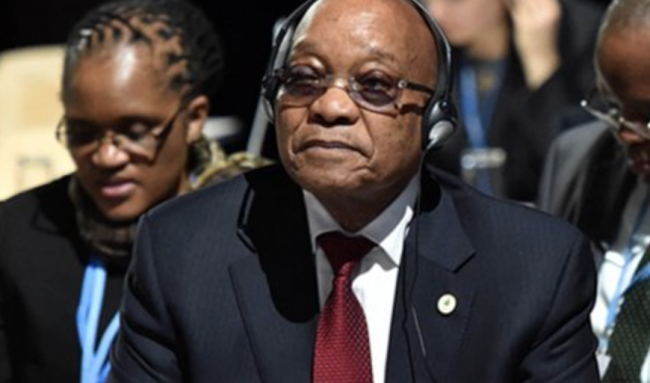
Two Major International Papers Strongly Criticise Zuma
It isn’t often that major news publications write editorials about a government not their own, or take its leader to task. But in the last few days both The Economist in Britain and The New York Times have written severely critical pieces about President Jacob Zuma. While many local publications have criticised Zuma over the events that unfolded […]

It isn’t often that major news publications write editorials about a government not their own, or take its leader to task. But in the last few days both The Economist in Britain and The New York Times have written severely critical pieces about President Jacob Zuma.

While many local publications have criticised Zuma over the events that unfolded after the sacking of finance minister Nhlanhla Nene and his being replaced by, as the Times put it, an “obscure political hack” and the disastrous fallout for the economy, the appearance of the foreign editorials is unusual.
While the Times said “Mr. Zuma has done far too much damage to his country to be let off the hook”, the Economist was more severe: South Africa “deserves better than Jacob Zuma”.
On Sunday the liberal Times, under the heading “Anger at South Africa’s Leader”, wrote that as the African National Congress has become more entrenched over the years, winning five successive national elections, “corruption and cronyism inevitably spread their tentacles, often under the pretext of setting aright the injustices of apartheid.
“The slide has been egregious under Mr. Zuma in the two years since Mr. Mandela died. He has routinely put cronies and relatives into senior positions, degrading public institutions; he has done nothing to contain the spread of corruption; he has recklessly enlarged the public work force, which consumes about 40 percent of the budget; he spent millions of dollars of public money to build himself a fabulous estate.”
The Times said that Zuma’s retreat – and his appointment of Pravin Gordhan – probably does not signify a conversion.
“Fortunately, many South African institutions, most notably the courts, have not been suborned by Mr. Zuma or his cronies, providing a foundation on which to rebuild an honest and competent government. For that to happen, the ANC must examine itself and the ravages of more than 20 years of continuous power.”
The Economist, meanwhile, titled its piece “Try Again, the Beloved Country – a Nation on the Brink Deserves Better than Jacob Zuma”.
The magazine said that since Zuma came to power in 2009, the country’s finances have grown ever more precarious.
“At first the ANC embraced open markets and fiscal discipline. Under Mr Zuma, however, the country’s macroeconomic stability, which underpins all the ANC’s social programmes, is imperilled. The commodity bust is partly to blame, but the main problem is the way Mr Zuma governs.
“He has acted as if the treasury were a bottomless purse with which to pamper ANC voters. Since 2006, the number of public servants has swollen by 25 percent, even as private-sector employment has fallen. South Africa now spends 40 percent of its budget on pay; similar countries spend 25 percent or so. Mr Zuma has also presided over a steady spread of corruption. Officials take kickbacks. Nurses steal from clinics. Union bosses sell public jobs to the highest bidder, leaving schools with teachers who draw salaries but never show up. A recent OECD study of maths and science scores in 76 countries placed South Africa second from bottom, below many poorer countries.
“And Mr Zuma has fostered the growth of a peculiarly self-righteous form of cronyism. The ANC favours ‘black economic empowerment, a policy that purports to right the wrongs of apartheid by nurturing a new class of black businesspeople. The state gives preference to black-owned contractors; private firms are leaned on to transfer shares to blacks. In practice this has enabled senior members of the ruling party to give juicy contracts to their cousins and grab slices of enterprises created by other people.
“ANC bigwigs have become fabulously rich with minimal effort. Ordinary black South Africans suffer, however, because all this scares off investors and retards economic growth, which will barely surpass 1 percent this year—slower than population growth and pathetic for an emerging market. Unemployment is 35 percent. Crime is widespread and stunningly violent. Unless things improve there is a risk that even more skilled South Africans, who pay most of the taxes, will emigrate. This is especially true of the 9 percent of the population who are white, many of whom have family ties abroad.”
The Economist concluded: “South Africa deserves better. The liberal Democratic Alliance, which governs the Western Cape reasonably well, may win control of some big cities in 2016. Yet the ANC’s grip on national power remains strong. Whether Mr Zuma’s grip on the ANC can survive an economic crisis, however, remains to be seen. In 2008 the party declared his predecessor, Thabo Mbeki, unfit to govern, forcing him to resign. This is unlikely to happen again. But if it does, the deputy president, Cyril Ramaphosa, would be a better steward of the economy. Though his business career owed much to his political connections, he is shrewd and competent. And South Africa needs a steady hand if it is to pull back from the precipice.”